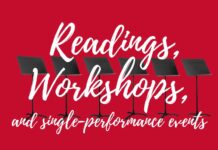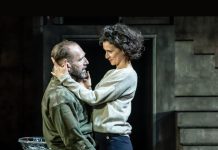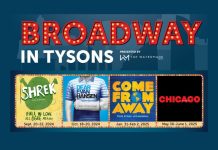The Theatre Lab School of the Dramatic Arts, Washington’s largest theatre school, is known for challenging students with very ambitious classes, some of which culminate in major performance opportunities. Their current Creating a Musical Role class, a learn-by-doing course designed to take students from the first read through of a musical through the final curtain, is no exception: Theatre Lab Directors Deb Gottesman and Buzz Mauro are shepherding a cast of 23 through a 10 week rehearsal and training process that culminates in a production of Violet opening this week.
Based on the short story “The Ugliest Pilgrim” by Doris Betts with music from Jeanine Tesori (Caroline, or Change) and lyrics by Brian Crawley (The Little Princess), Violet is the story of a disfigured young woman’s journey by Greyhound to meet with a televangelist whom she hopes will heal her. Set in the South circa 1964, it also explores race relations, what it means to feel like an outsider, and the role self-perception plays in who we become.

Until this year, Violet was a little known gem of a musical, having had a brief off-Broadway run in 1997 and becoming a cult favorite among musical theatre buffs though it was rarely produced by major theatres. That all changed this year when it was revived not only by Ford’s Theatre in a recent production but also in a streamlined version starring Sutton Foster which just opened on Broadway.
The Theatre Lab took on the project because it offers great learning opportunities and challenging roles for a cast with diverse experiences. Cast members range in age from 11 years old (an ensemble member who wanted to take the class with her father) to late 60s. Some have worked on professional stages; others are participating in their very first musical.
And that’s just the way the directors like it. “We love to aim high,” says director Deb Gottesman. “There’s nothing easy about this piece—its themes are complex, the music is deceptively hard, and it demands a lot from the actors.”

Adds Buzz Mauro, “We believe that people learn the most when they are asked to do the hardest things, even beginners.”
“What we especially love about this project,” says Gottesman, “is that, in acting we are always talking about ‘journey.’ How is the character different at the end than at the beginning? And this play—more than half of which takes place on a bus—is about a literal journey as well as a figurative one.”
We asked some of the cast members to tell us about their journey with the play. This is what we got back:
_______
JULIE DIXON (playing Violet)

Tell us a little about your background. Is theatre a big part of your life? What do you do offstage?
Growing up, music and theatre were a huge part of my life. But after graduating from college, life kind of got in the way; I worked as a recording artist and songwriter for about 5 years and wasn’t in one place long enough to really settle in and find the local theatre opportunities. Then, I went back to grad school, got a “real” job and settled down here in DC. I now work at Georgetown — I’m an adjunct professor in the graduate public relations program and run a research center there. (And feel so absolutely fortunate to have found opportunities like this to return to theatre!)
What drew you to Creating a Musical Role?
Last year, on a whim, I Googled “adult musical theatre classes in DC” and found out about Theatre Lab’s Creating a Musical Role production of Les Mis (two days before auditions!). I was in the ensemble of that production and was truly transformed by the experience — I felt like I learned so much and loved being surrounded by such amazing, inspiring and creative people. I’ve taken other TL classes since, and when the opportunity to audition for this show came up, it was a no-brainer.
Why do you think Violet is having a renaissance at this moment in time? What appeals to you about the play?
I had never heard of the show before the auditions, but at its heart I think it’s just a really moving story with these big, universal themes that everyone can relate to in one way or another. It’s definitely not an “easy” piece of theatre to digest; it makes you think. I like that it places high expectations on audiences to really invest themselves in the characters and their journeys. And coming from more of a non-traditional musical background and training (at least by Broadway standards!), I love all of the different styles infused in the score — the gospel, the R&B, the country.
What’s been the biggest lesson for you working on this piece for the last 10 weeks?
Where do I begin?! I think one of the biggest lessons for me has been embracing the messiness. In so many other areas of my life and career, I feel like there’s a “right” way and a “wrong” way to do something — and that simply doesn’t exist in this process. Deb is amazing about giving us freedom to make strong choices, and while this initially frightened me to my very core (“what if I don’t make the right one??”), I’ve learned how to start doing this.
What’s been the hardest part?
I think most people assume that the hardest part would be remembering all of my lines and songs I have to sing, but that’s actually the easy part compared to everything else! For me, I think it’s been really challenging trying to make sense of the character of Violet and to be true to that in every part of her story and her journey.
Has working on this production changed the way you think about preparing for musical theatre. If so, how?
Absolutely! It’s made me more willing to take risks and to try things; to ask questions and to start — not end — with the lines on the page. I was initially really nervous because of all the dialogue in the show — I considered myself a singer before this process, not an actress. But I feel like I now have the tools to maybe start calling myself an actress because of this process.
______
KEVIN YOUEL PAGE AND EVA YOUEL PAGE

(father and daughter playing a variety of roles in the ensemble)
Tell us a little about your background-is theatre a big part of your life? What do you do offstage?
Eva (age 11) has recently become very interested in theater after taking violin lessons for five years, playing in an orchestra, and being part of a movie that was a finalist in the Baltimore 48 hour film festival last year. I (Kevin) was deeply involved in his high school theater in Croton, NY, summer Shakespeare festival, and was in an equity showcase when he was 13 years old. I’ve been singing a capella since college and I’m now looking to return to theater in mid life.
What drew you to Creating a Musical Role?
We both wanted to enjoy learning about theater together and sharing the love of the stage and thought it would be great to have the experience of working together on a real show. It was fortunate that Violet has such a strong father/daughter theme.
Why do you think Violet is having a renaissance at this moment in time? What appeals to you about the play?
Violet is such a complicated piece involving coming of age, civil rights, faith and religion, overcoming life’s adversity, and fathers and daughters finding peace. Maybe it’s finding a revival because even though it is set in 1964, these are all themes with us today. The music, too, is unusually complicated and interesting.
What’s been the hardest part of working on this piece for the last 10 weeks?
The hardest part has been balancing life and the work in the theater. When is there time to sleep and do homework?!
Has working on this production changed the way you think about preparing for musical theatre. If so, how?
Both of us have spent real time thinking about our characters and trying to understand what they need—right now—which is a real improvement on my work as teen actor. The level of professionalism that the Theatre Lab demands is excellent preparation for both of our next projects, whatever they might be.
______
ETERNANDA FUDGE (Ensemble/Mabel)

Tell us a little about your background-is theatre a big part of your life? What do you do offstage?
Theatre has always been a big part of my life. Having graduated with a bachelor’s of arts in theatre performance, you would think I’d be on every stage by now however that has not been my path. I have found that through exploring several gifts of mine, I have kind of put acting down and am now picking it back up; full force! Offstage I am a business owner as well as an acting teacher and coach.
What drew you to Creating a Musical Role?
When I saw the audition, I thought about how I never stepped foot into an audition room to show my vocal skill…never done a musical and that moment would have been a great time. I seized the moment. Had some trouble with scheduling and wasn’t going to go to the call backs. I made it. Here I am.
Why do you think Violet is having a renaissance at this moment in time? What appeals to you about the play?
Race relations are real and have not gone anywhere. Yes we have come far enough to where some may think alot of the dialogue would never be said in today’s society however people say the same things many different ways. This show is absolutely relevant. We have identity crisis all over. Many consider themselves ugly and ashamed and many seek superficial ways to satisfy the void of rejection and humiliation. The themes in this Musical will never go away. However I believe Violet presents a new ending, as you will see when you come out April 3,4,5,10,11 & 12.
What’s been the biggest lesson for you working on this piece for the last 10 weeks?
How to perform at my personal best when obstacles tend to arise every second of every day you decide to commit. How to focus intently without missing a beat, not without mistake, simply without missing a beat.
What’s been the hardest part?
The hardest part is multitasking—music, dancing and memorizing….lol. But once you get it you will never forget.
Has working on this production changed the way you think about preparing for musical theatre. If so, how?
This production is my very first musical. I am so delighted to have been able to experience it within the comfort of Buzz and Deb! They are so awesome. They are giving. They are lenient. They care. They are concerned that we learn. They also don’t take no mess!
______
SAM LANDA (Ensemble/Billy Dean)

Tell us a little about your background-is theatre a big part of your life? What do you do offstage?
I am in eighth grade. Musical theatre is new to me, however, I am a dancer at The Washington School of Ballet. Since I was young, dance has been a big part of my life.
What drew you to Creating a Musical Role?
I recently became interested in musical theatre, and I looked toward Theatre Lab as a place to start. I was very excited when I heard that they were doing this production because my summer camp performed it and I had friends in it. Although my original plan was for my first show to be a show with lots of dancing (making it a little bit easier for me), I auditioned for Creating a Musical Role/Violet, and I got in!
Why do you think Violet is having a renaissance at this moment in time? What appeals to you about the play?
I think Violet is having a renaissance because of the way it is written. As it follows Violet, it shows you bits and pieces of her past. Her past is not shown in order which makes it a little hard to understand, but it also makes it more thought-provoking. Different people can take away different meanings and themes from the show, and people like that.
What’s been the biggest lesson for you working on this piece for the last 10 weeks?
Stay open to new ideas. People can take away different things, but the show can also be very different from an actor’s perspective. I saw it both at my camp and Ford’s Theatre, and our version is completely different. Originally, I thought that most of the stuff would be the same but nearly nothing is.
What’s been the hardest part?
Singing, because I have never done any singing this hard on stage since most of my previous shows have been dance shows.
Has working on this production changed the way you think about preparing for musical theatre. If so, how?
I thought it would be similar to preparing for dance shows, but it’s not. I assumed that they would be similar in preparation, but they aren’t. Personally, I have found that dance shows are more physically tiring while musical theatre is more work mentally. You need to multitask (sing, act, dance) and stay alert for mistakes and then coping with them.
______
WHEN: April 3, 4, 5 at 7:30 pm
April 10, 11, 12 at 7:30 pm
Doors open 30 minutes before performance time
WHERE: The Theatre Lab – 733 8th Street NW,
Washington, DC 20001
TICKETS: Tickets are $15. To purchase tickets please visit: https://theatrelab.org/?q=content/purchase-ticket.





